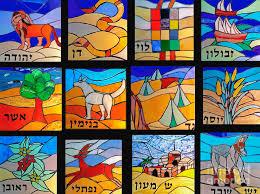The First Census:
The Old Generation of Rebellion
1: 1-54

After making the covenant (see the commentary on Exodus, to see link click Dd – The Mosaic Covenant) and giving the Torah at Mount Sinai (see the commentary on Deuteronomy Bi – The Stipulations of the Covenant), ADONAI instructed Moshe to take a census of all the tribes of Isra’el by clans and families. Their encampment and order of march was likened to a military formation and operation. Up to this point in the Torah the metaphor of a husband and wife has been used to describe that relationship between YHVH and His people. But now, the picture changes to an army. Isra’el is the army of Ha’Shem! He is the Commander-in-Chief who speaks from the midst of His “command post,” the Tabernacle. To take the Promised Land, there needed to be a war a holy war (see Deuteronomy Ag – The Problem of Holy War in the TaNaKh). But Isra’el was not able to fight this war on her own. The Divine Presence dwelled in their midst to give command, direction, and encouragement to the people of Isra’el.11
As such, they would only count the men deemed fit for military service, those who were twenty years old or older on the first day of the second month of the second year after the Exodus. One man from each tribe was to assist Moses. After careful research of clan and family records, the qualified males were listed by their respective tribes. However, the Levites were not counted, for they were exempt from military service in the sense of bearing arms. This is implied in the fact that they were set apart for the service of the Tabernacle and all its furnishings. Only they could erect and dismantle it; any others who touched it would die. Moreover, the Levites pitched their tents adjacent to the Tabernacle, and the other tribes in the outer perimeter.12 Thus, by using these numbers, the Holy One was demonstrating the miracle of Isra’el’s survival that He had accomplished.
One more critical point needs to be made here. The war that Isra’el was to fight was not just a physical war where people would die and blood would be shed. On the contrary, it was primarily a spiritual battle. Isra’el was commissioned by God to make His name known throughout the earth. He gave them a piece of property in which to carry our these “operations.” There were strong spiritual forces set in opposition against Isra’el – the gods of the Canaanites. Therefore, the God of this universe, the Commander of ADONAI’s army (Joshua 5:14) decided to pitch His tent in the midst of Isra’el and direct the battle Himself. Isra’el needed Him to war against the powers and principalities, which were demons and idols of the Canaanites.
Things have changed very little since the Israelites went against the gods of the Canaanites. Believers everywhere are commanded to put on the full armor of God, for our struggle is not against flesh and blood, but against the authorities, against the power of this dark world and against the spiritual forces of evil in the heavenly realms (Ephesians 6:10-12). Moreover, just as ancient Isra’el needed to have the camp of the Sh’khinah among them, so do we. But how can the Divine Presence rest in our midst today? We find the answer to this in the rest of Ephesians 6 (see the commentary on Ephesians Ca – The Spiritual Battle). When we, as individuals, and as a community of believers, continually wear the armor which God gave us, we are allowing Him to dwell through us. Having this kind of uniform, we can rest assured that His Presence will be with us in each and every battle into which He leads us.13



Leave A Comment